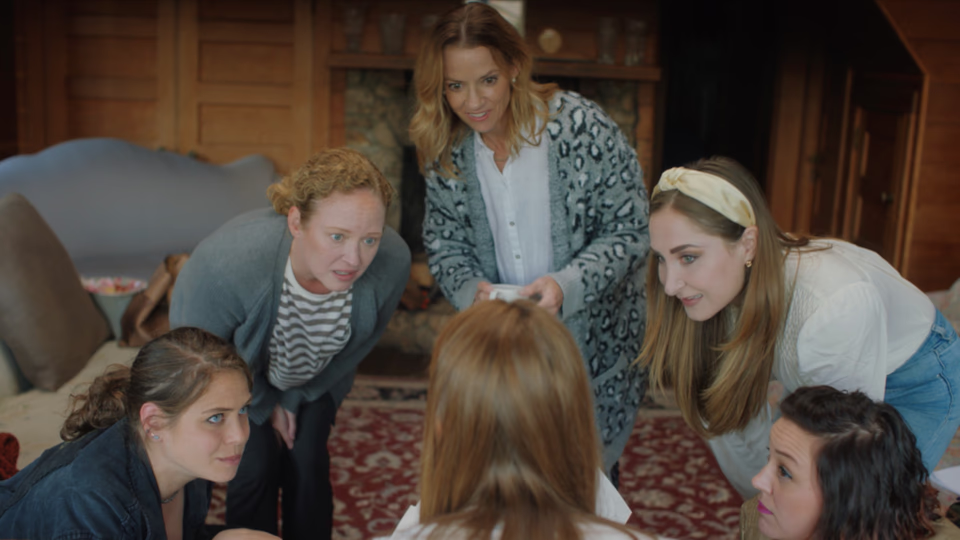Soft & Quiet

A woman chairs a meeting of like-minded women. Afterwards, some attendees stop at a local market for wine. A chance encounter escalates to confrontation and a series of dreadful choices.
I’ve already said too much. This is a powerful film undone by a singular flaw. Worth watching if you can avoid spoilers. But discussing said flaw requires spoilers, so go watch. I’ll wait.
Back? Great. What a ride, huh? A Bizarro World film. The viewing experience proves oppressive, often uncomfortable. You spend the entire time rooting against the protagonists and yet, when they fail at the end, it disappoints.
The film’s strength lies in its verisimilitude. We meet a woman taking a pregnancy test in a public bathroom. She cries at the results. She exits the bathroom and we discover she’s a teacher. It’s past dismissal time, and she’s heading for an after-school meeting at the local church. She’s bringing pie. En route, she displays hints of hostility bordering on paranoia. Then we see the pie.
This proves a master class in show versus tell. We’re introduced to a woman and invited to empathize with her. But her actions keep us at arm’s length before the pie reveal shoves us into the role of passive spectator.
But we don’t look away. We stare, engrossed. We recognize these women—at first. They’re the other moms at our kid’s birthday parties, the teachers at our kid’s school, the cashier at the local shop. The real-time, continuous shot style enhances the sense of voyeurism. As the women confide in one-another, their dialog rings true, and we sit horrified. I’ve often complained about the reductive depiction of racism in films. Not here. Writer/director Beth de Araújo recognizes its insidious nature and depicts it as a cancer, eating away at these women’s moral center.
Araújo affords each woman an opportunity to voice her character’s pathetic rationalizations. These justifications don’t evoke sympathy or even empathy, but repulsive horror at how casual racism can mask deeper sentiment. A joke begets an epithet. An epithet begets resentment. Resentment begets hate.
This theme of organic escalation continues throughout the film, as does the cinéma vérité style. Despite several scenes packed with screams and tears, you never sense you’re watching a performance. As an illusion, the film astounds.
But about that ending. Its unbelievable nature shatters the illusion, like a magician who, after putting the sawn-in-half assistant back together, slips and reveals the second assistant providing the legs in the box’s lower half.
So why did Araújo do it? I have three theories.
The first being the film’s grim nature. Perhaps financiers balked at the oppressive cynicism and Araújo compromised on the ending to secure funding and/or distribution. I hope not.
My second theory has Araújo commenting on the resilient nature of the oppressed. A literal “you can’t kill us” empowerment message. A fine idea, but there’s no thematic precedent for this interpretation seeded anywhere in the film. Imagine Kirk Douglas’s corpse winking on the cross at the end of Spartacus.
My third theory proves a stretch, but bear with me. Building on the film’s Bizarro World nature, what if the film is an inverted horror story? In a traditional horror we root for the good-guys as they endure torments before slaying the monster, only for the film to end with the monster’s hand erupting from the grave, or opening its eyes, or otherwise revealing “it’s not over” because the monster lives.
Now consider that trope inverted. We follow the monsters as they endure torments before slaying the good-guys only for the film to end by revealing “it’s not over” because the good guy lives.
I love this as a thought-experiment, but admit the execution doesn’t fit. For the first ninety minutes, Araújo shuns tropes in favor of grim realism. Going back to the magician analogy, you can’t reveal the trick in error, then claim you meant to all along.
So what to make of the film? The first ninety minutes hold you rapt through what should be an unwatchable experience. But the last minute undermines everything that came prior. I’ve split the difference and labelled it “okay”. If you asked me about it, I might start by saying, “It’s good, but…”